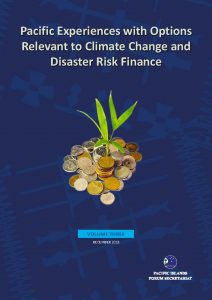Pacific Resource for Climate Change and Disaster Risk Finance Launched
- Home
- Publications
- Pacific Resource For Climate Change and Disaster Risk Finance Launched

4.30pm (Fiji Standard Time), Tuesday 26 March 2019 SUVA, Fiji: A practical resource for countries dealing with the escalating impacts of climate change and disasters from natural hazard risks has been launched by the Pacific Islands Forum Secretariat (PIFS). The Pacific Experiences with Options relevant to Climate Change and Disaster Risk Finance booklet explores the experiences of Pacific Island countries in implementing various climate change and disaster risk finance options. It is designed to a provide real-word lessons for other countries to learn from and potentially adapt to their national circumstances. 
“This resource recognises and reflects the innovative work and growing experience of the Blue Pacific continent in resilient development. “The approach of sharing lessons-learnt acknowledges the importance of intra, and inter, regional peer-to-peer learning and collaboration on the very technical areas of climate and disaster risk financing. “We have much to learn and share with each other, and co-operation of the sort outlined in this booklet is vital if our region, and those that face similar threats, are to overcome the challenges of rising sea-levels and a warming climate,” said Pacific Islands Forum Secretary General, Dame Meg Taylor. Produced under a collaboration between PIFS, the Pacific Community (SPC) and USAID, the booklet is structured according to the seven pillars of the Pacific Climate Change Finance Assessment Framework, which has now been applied in eight Pacific countries. The seven pillars are: funding sources, policies and plans, institutions, human capacity, public financial management and expenditure, development effectives, and gender and social inclusion. This publication documents the following case-studies from the Pacific:
- Tuvalu’s Climate Change and Disaster Survival Fund and the Fiji Green Bonds as examples of innovative approaches to generate financing for climate change and disaster risk reduction.
- The Framework for Resilient Development in the Pacific (FRDP) and the Papua New Guinea Climate Change Act are presented as examples of policy and legislative frameworks that guide the implementation of climate change and resilience initiatives.
- The cases of the Micronesia Conservation Trust attaining Regional Implementing Entity (RIE) to the Global Climate Fund (GCF) and National Implementing Entity (NIE) to the Adaptation Fund and Vanuatu’s National Advisory Board on Climate Change and Disaster Risk Reduction are highlighted as good practice examples exemplifying institutional strengthening and coordination for climate change and disaster risk reduction.
- Experiences of the University of the South Pacific’s (USP) Pacific Centre for Environment and Sustainable Development (PaCE-SD) and the Regional Technical Support Mechanism (RTSM) show examples of regional capacity building for climate change.
- Public Financial Management (PFM) is an integral part of accessing and managing climate change finance and ensuring robust and credible PFM systems is important. The booklet features PFM reforms in Kiribati and Samoa and internal audit strengthening in Tuvalu and shares these experiences to enable increased and direct access to climate change finance.
- Ensuring the effectiveness of climate change and resilience programmes leads to greater impacts. The Choiseul Integrated Climate Change Programme (CHICCHAP) in Solomon Islands and the Joint Work planning and missions approach to project implementation undertaken by the DFAT/GIZ Climate Finance Readiness of the Pacific Project and the USAID/SPC Institutional Strengthening of Pacific Island Countries to Adapt to Climate Change (ISACC) Project highlight ways of ensuring greater harmonisation and effectiveness.
- The Pacific Gender and Climate Change Toolkit and Gender sensitive budgeting in Vanuatu are presented as examples of gender mainstreaming in climate change.
It is hoped that this booklet will be periodically updated as new and emerging experiences are available within the region. A copy can be viewed and downloaded here [ENDS]
Media contact: Catrina Rowe catrinar@forumsec.org M: (+679) 9986455 Communications & Public Affairs Pacific Islands Forum Secretariat


